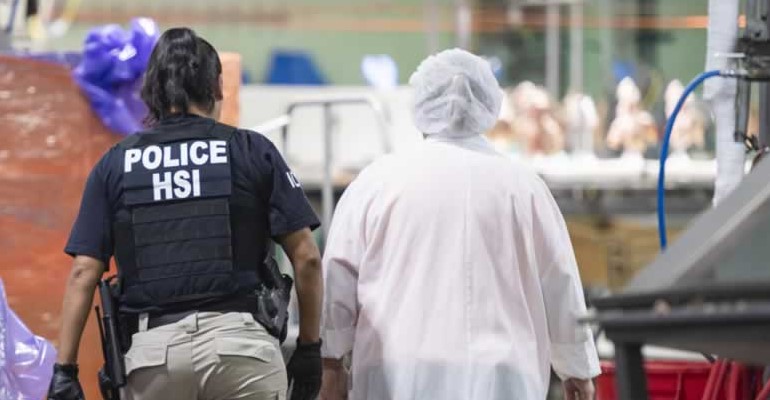ICE raids seven Mississippi ag processing plants
Nearly 700 detained as part of ICE efforts to deport unauthorized workers.

Seven agricultural processing plants across Mississippi, including poultry companies Koch Foods Inc. and Peco Foods Inc., were raided Wednesday after the U.S. Immigration & Customs Enforcement’s (ICE) Homeland Security Investigations (HSI) executed multiple federal criminal search warrants as part of an ongoing HSI worksite enforcement criminal investigation.
ICE officials detained approximately 680 “removable aliens” who they said were unlawfully working at the plants. Mike Hurst, U.S. attorney for the Southern District of Mississippi, called it the “largest single-state worksite enforcement action” in the nation’s history.
In Morton, 40 miles east of Jackson, Miss., workers filled three buses — two for men and one for women — at a Koch Foods plant. Other companies targeted in Mississippi the raids included Peco Foods, PH Food Inc. in Morton, MP Food Inc. in Pelahatchie and Pearl River Foods Inc. in Carthage.
“We are fully cooperating with the authorities in their investigation and are navigating a potential disruption of operations,” Peco said in a statement, adding that it participates in E-Verify, which screens new hires for their immigration status.
In addition to executing federal search warrants and seizing business records pertaining to the ongoing federal criminal investigation, deportation officers with ICE Enforcement & Removal Operations, in partnership with HSI, detained approximately 680 removable aliens who were unlawfully working at the plants.
“HSI’s worksite enforcement efforts are equally focused on aliens who unlawfully seek work in the U.S. as well as the employers who knowingly hire them,” said Jere Miles, HSI special agent in charge in New Orleans, La.
Some of those detained were identified as being eligible for an alternative to detention based on humanitarian reasons. These individuals will be physically returned by HSI to their original place of detention and will still be required to appear before a federal immigration judge, who will ultimately determine whether or not they will be deported. Currently, all cases are being handled via administrative law procedures at the U.S. Department of Homeland Security.
Unauthorized workers often use stolen identities of legal U.S. workers, which can profoundly damage the credit, medical records and other aspects of everyday life of identity theft victims for years.
HSI worksite enforcement investigators help combat worker exploitation, illegal wages, child labor and other illegal practices. Worksite enforcement investigations often involve additional criminal activity, such as alien smuggling, human trafficking, money laundering, document fraud, worker exploitation and/or substandard wage and working conditions.
In addition to worksite enforcement operations like this one, HSI also uses I-9 audits to create a culture of compliance among employers. In August 2018, ICE raided agricultural firms in Nebraska, Minnesota and Nevada, resulting in 133 arrests. In June 2018, arrests were made in Ohio and Tennessee processing plants.
There has been a significant spike in investigations under the Trump Administration. From Oct. 1, 2017, through May 4, 2018, HSI opened 3,510 worksite investigations, initiated 2,282 I-9 audits and made 594 criminal and 610 administrative worksite-related arrests, respectively. In comparison, for fiscal year 2017 – running from October 2016 to September 2017 – HSI opened 1,716 worksite investigations, initiated 1,360 I-9 audits and made 139 criminal arrests and 172 administrative arrests related to worksite enforcement.
President Barack Obama did not execute the publicized raids and instead focused on low-profile audits. During the George W. Bush Administration, larger raids were more common, such as one on a kosher meat packing plant in Postville, Iowa, in 2008 in which nearly 400 workers -- mostly from Guatemala -- were jailed and taken away.
About the Author(s)
You May Also Like





